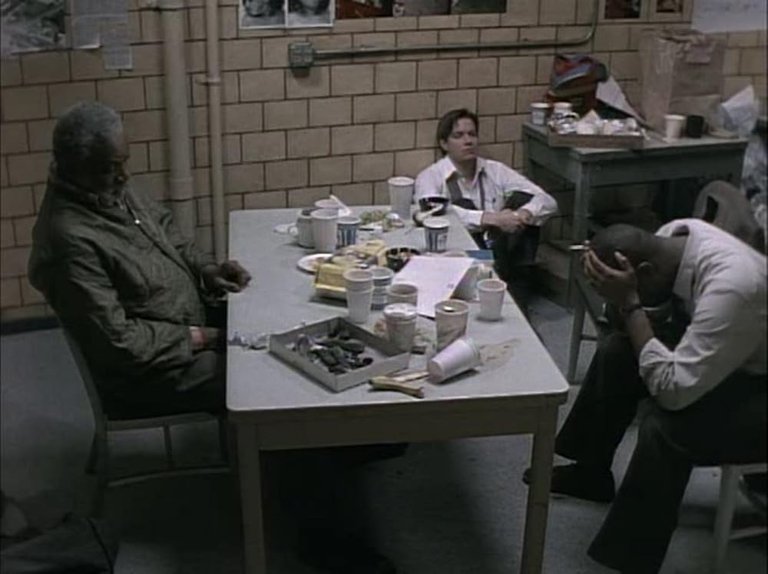
Three Men and Adena (S01E05)
Airdate: 3 March 1993
Written by: Tony Fontana
Directed by: Martin Campbell
Running Time: 46 minutes
Three Men and Adena stands as a quintessential example of a "bottle episode," a term used to describe a specific type of television episode characterised by its limited setting and cast. These episodes are often produced to save costs or to provide deeper character development without the distractions of elaborate sets or numerous locations. While many bottle episodes might be forgettable, some transcend their constraints to become memorable highlights of their respective series. Three Men and Adena, the fifth episode of Homicide: Life on the Street, is one such episode.
The plot revolves around the murder of Adena Watson, a case that looms large over the first season and indeed the series as a whole. The episode begins with the Homicide Unit finally securing a warrant to arrest and interrogate Risley “Arab” Tucker, portrayed by Moses Gunn. Tucker, an elderly street fruit vendor, a recovering alcoholic accused of having an inappropriate relationship with the young Adena, leading to suspicions about his involvement in her murder. However, the physical evidence against him is tenuous at best. Lieutenant Giardello informs primary investigator Tim Bayliss that they have only twelve hours to extract a confession from Tucker before he must be released, after which Bayliss will be reassigned to regular murder cases. The dynamic between Bayliss and his more seasoned partner, Pembleton, initially follows the familiar "good cop, bad cop" trope but quickly evolves into a psychologically charged game. Tucker deftly manipulates the interrogation, forcing Bayliss and Pembleton to confront their own moral complexities while he tantalisingly skirts around admitting guilt.
Set almost entirely within the confines of Baltimore PD headquarters, specifically in the interrogation room known colloquially as "the box," the episode thrives on its limited setting. Tom Fontana's writing excels in this environment, using the confined space to deepen our understanding of both Bayliss and Pembleton's characters while introducing unexpected narrative twists. At the outset of their interrogation, Bayliss is convinced of Tucker's guilt, while Pembleton remains sceptical. As the episode progresses, this certainty shifts; Bayliss becomes increasingly unsure of Tucker's culpability, whereas Pembleton grows more convinced that they have apprehended their man. This shift not only adds tension but also reflects the complexities inherent in human judgement and morality.
A hallmark of Homicide: Life on the Street is its commitment to realism, particularly evident in Three Men and Adena. The episode eschews tidy resolutions typically found in police dramas; instead, Fontana intentionally leaves the question of Tucker's guilt ambiguous. This refusal to provide clear answers reinforces a central theme of the series: that justice is not always served and that sometimes criminals evade accountability.
However, one notable issue arises within this otherwise compelling narrative: Tucker's unexpected intelligence and his ability to engage in social commentary regarding class divisions within the African American community feels somewhat out of place. While this segment aims to add depth to his character, it comes across as slightly unconvincing compared to the rest of the episode’s tightly woven narrative fabric.
The direction by Martin Campbell enhances the episode’s impact, but it is undoubtedly the performances that elevate it further. Kyle Secor as Tim Bayliss and Andre Braugher as Frank Pembleton deliver commendable performances; however, it is Moses Gunn who truly shines as Risley Tucker. Gunn’s portrayal brings a profound complexity to a character who could easily have been reduced to mere villainy. His nuanced performance elicits empathy from viewers for a man who embodies both vulnerability and darkness. Tragically, this role marked Gunn's final performance before his passing months after the episode aired, adding an additional layer of poignancy to his already powerful portrayal.
Three Men and Adena exemplifies how a bottle episode can transcend its limitations through masterful writing, direction, and acting. While it grapples with themes of guilt and innocence without providing easy answers, it does so with an authenticity that reflects real-world complexities.
RATING: 8/10 (+++)
Blog in Croatian https://draxblog.com
Blog in English https://draxreview.wordpress.com/
InLeo blog https://inleo.io/@drax.leo
Hiveonboard: https://hiveonboard.com?ref=drax
Rising Star game: https://www.risingstargame.com?referrer=drax
1Inch: https://1inch.exchange/#/r/0x83823d8CCB74F828148258BB4457642124b1328e
BTC donations: 1EWxiMiP6iiG9rger3NuUSd6HByaxQWafG
ETH donations: 0xB305F144323b99e6f8b1d66f5D7DE78B498C32A7
BCH donations: qpvxw0jax79lhmvlgcldkzpqanf03r9cjv8y6gtmk9